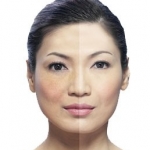Skip to content
JAPANESE WOMEN’S QOL IMPACTED BY PIGMENTARY DISORDERS
 A L’OREAL STUDY IN JAPAN USING BEAUTYQOL
A L’OREAL STUDY IN JAPAN USING BEAUTYQOL
Cosmetic skin concerns and their impact on the quality of life is once again the subject of a scientific article published recently by the Journal of Cosmetic and Laser Therapy*. This study run by L’Oréal Research & Innovation in collaboration with Data Mining International, a Swiss independent research agency and the project leader of the development of the BeautyQoL® measuring instrument, aimed to assess the link between the skin pigmentary disorders among the Japanese women and the various aspects of their lives, all of which contribute to their quality of life. As fairer skin tone is culturally more desirable in Japan and Asian countries in general, the hypothesis that the uneven skin tone and facial dark spots do indeed influence negatively the quality of life, was confirmed by this research project.
The BeautyQoL® instrument has been specifically designed to scientifically measure the impact of cosmetic products and physical appearance on Quality of Life (QOL). By providing both a global score and specific scores for each of the five dimensions, namely social life, self-confidence, mood, energy, and attractiveness, the BeautyQoL® questionnaire enables the assessment of each dimension contributing to the overall QoL of subjects having cosmetic concerns, as well as the potential benefits of cosmetic products used to either treat or camouflage them.
The specificity and the sensitivity of the BeautyQoL® instrument make it possible to capture even the smallest variations in QoL influenced by the physical appearance or the use of cosmetic products, thanks to which, the study in question was able to discover, for instance, which of the five dimensions of QoL was impacted the most (mood) but also, how the other four dimensions were distributed with regards to how the Japanese women were gravely concerned or not with their skin issues. Overall, both the global score and the five dimensions measured in the study, point to the fact that the Quality of Life does appear to be affected in the subjects with skin tone problems and dark spots.
The BeautyQoL® instrument is currently the only existing scientific instrument validated in 16 cultures and built specifically to discriminate small variations in the Quality of Life relevant to the physical appearance. BeautyQol® provides the most robust tool for scientific and market research application in cosmetology. Indeed, with its wide-ranging potential applications it is currently being used in various studies both in the cosmetic and beauty care industry as well as in the academic research projects. As a pioneer in its field, BeautyQoL® represents an important advancement in the domain of the quality of life, reserved until recently mostly to the pharmaceutical research. By generating robust quantitative evidence, for the first time, BeautyQoL® can scientifically assess and firmly establish the humanistic impact of pigmentary (and other aesthetic) disorders as well as to differentiate and demonstrate the added value of cosmetic products and interventions.
Scientific references:
*Beresniak A, Auray JP, Duru G, Aractingi S, Krueger GG, Talarico S, Adam AS, Piot B, Dupont D, de Linares Y. Impact of pigmentary disorders on quality of life in Japan: Interest of the BeautyQoL instrument. J Cosmet Laser Ther. 2015 Dec;17(6):313-7. doi: 10.3109/14764172.2015.1039034. Epub 2015 Jul 2.
Beresniak A, de Linares Y, Krueger GG, Talarico S, Tsutani K, Duru G, Berger G. Validation of a New International Quality-of-life Instrument Specific to Cosmetics and Physical Appearance. BeautyQoL Questionnaire. Arch Dematol 2012; 148 (11): 1275-1282
Back to Press Releases
 A L’OREAL STUDY IN JAPAN USING BEAUTYQOL
A L’OREAL STUDY IN JAPAN USING BEAUTYQOL